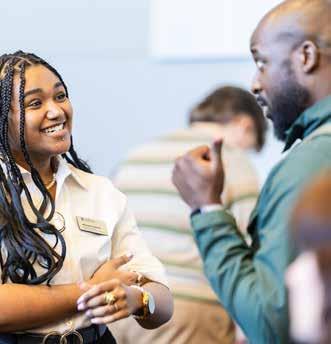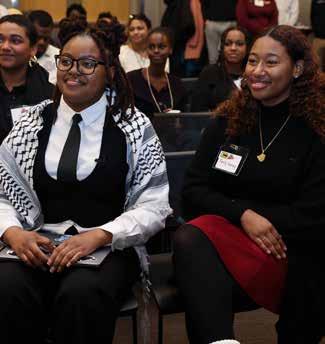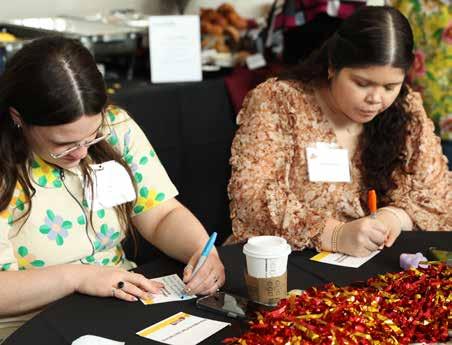“
“ Diversity, Equity, and Inclusion is not something we do; it is who we are.
Friends and colleagues,
It is with deep gratitude and great pride that I share this inaugural Impact Report. In just a few short years, our university community has made remarkable progress—laying a strong foundation, building bridges across our differences, and fostering spaces where members of the community are seen, heard and valued. These achievements are a testament not only to our collective effort, but to our Jesuit Catholic values rooted in human dignity, the pursuit of justice, and care for the whole person (cura personalis).

The work of diversity, equity, inclusion, and belonging is not separate from our identity—it is a powerful expression of who we are. In a world often marked by division, our commitment to inclusive excellence calls us to lead with courage and compassion, to form individuals who are not only for others but with others. This work is not always easy. It requires resilience, humility, and hope. And yet, as this report shows, the impact is undeniable—and growing.
As we look ahead, may we stay grounded in our values, energized by our progress, and unwavering in our pursuit of a more just and inclusive campus. The journey continues, and each of us has a role to play.
With gratitude and resolve,

Chief Diversity Officer and Inaugural Vice President
THE MISSION OF LOYOLA...
We are Chicago’s Jesuit Catholic University—a diverse community seeking God in all things and working to expand knowledge in the service of humanity through learning, justice, and faith.
As a Jesuit Catholic University, the work of diversity, equity, inclusion and belonging is deeply interwoven into our mission as we embrace our commitment to justice, compassion, and holistic education. Grounded in the Jesuit principle of cura personalis, or care for the whole person, our initiatives strive to create inclusive environments where every individual is recognized and valued.
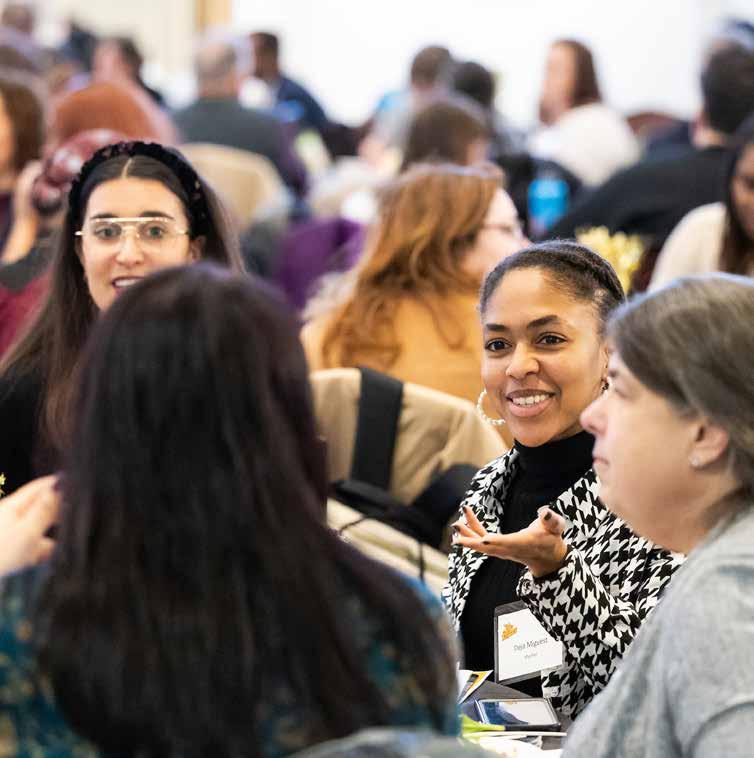
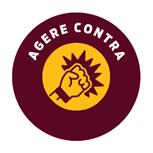
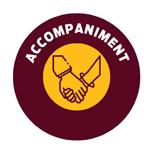



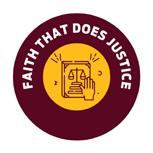
...IS ENHANCED BY OUR WORK.
To foster a human-centered culture of belonging, the Office of Institutional Diversity, Equity, and Inclusion (OIDEI) serves as vocal advocates, engaged allies, and collaborative change agents. We empower faculty, staff, and leadership to champion inclusive excellence by connecting, consulting, coaching, and capacity building in support of igniting our students’ full human potential. A sustained commitment to diversity, equity, inclusion, and belonging efforts demonstrates alignment with our Jesuit Catholic values and institutional mission. Ultimately, our work promotes Loyola’s reputation as a welcoming, inclusive place to learn and work.
3


INSTITUTIONALIZING THE
WORK
OUR STRATEGIC PRIORITIES
READI ADVISORY BOARD
A leadership group created to advise, support, and champion the strategic plan, priorities, and tactics that lead to diversity, equity, inclusion, and belonging.
Annual awards given to departments or units that demonstrate a commitment to our mission and vision.
A group of leaders responsible for advancing inclusive excellence goals for their respective unit who come together to share knowledge, improve skills, and seek collective impact.
A monthly communication to our broader community to share updates, increase awareness of efforts across campus, celebrate our impact, and ultimately enhance alignment of efforts.
Racial justice, equity, accessibility, diversity and inclusive excellence (READI) form the backbone of our practices. Our READI framework acknowledges the pluralistic nature of our faculty, staff, and student population. As we seek to institutionalize this work, we recognize that we can’t do it alone. A multipronged strategy coupled with resources and support networks allows us to have collective impact. Reached 150+ faculty and staff through 7 sessions.
Faculty members who serve as leaders, experts, and internal consultants to advance the university’s mission and inclusive excellence goals.
A group of faculty and staff members who identify as advocates and ambassadors for diversity, equity, inclusion, and belonging.
A fund created to invest in innovative initiatives aligned with our mission and values.
A four-part learning series that support faculty and staff in better understanding and incorporating the values of diversity, equity, inclusion, and belonging. READI PROFESSIONAL DEVELOPMENT SERIES
OIDEI is focused on five strategic priorities. These priorities align with our belief that the purpose and goals of diversity, equity, inclusion, and belonging are people focused—it’s why the work matters. Our strategic plan is designed to provide the greatest impact among our faculty, staff, and leadership because we know that investing in faculty and staff leads to better student outcomes and academic excellence. On the following pages, we focus in detail on the three priorities directly within OIDEI’s sphere of influence: Learning & Development, Culture & Climate, and Structures & Systems.
RESPONSIBLE + ACCOUNTABLE
OIDEI owns these strategic priorities to guide faculty, staff, and leadership
CONSULTED + INFORMED
OIDEI prepares and supports faculty, staff, and leadership within their individual units Recruitment & Retention Scholarship & Teaching 4 5
PRIORITY 1:
LEARNING & DEVELOPMENT
We provide ongoing learning and educational opportunities to equip our faculty, staff, and leadership with the knowledge and skills to be able to fully engage and function across differences in an increasingly pluralistic society.
Launched a series of online discussions for Loyola faculty and staff to create a space for building community and belonging.
In partnership with the Office of Faculty Affairs, established a cadre of READI Coaches to further inclusive excellence goals.
Established an online group of faculty and staff members who identify as advocates and ambassadors for diversity, equity, inclusion, and belonging.
Hired 7 READI coaches who trained
faculty on inclusive faculty hiring strategies.
Connected a network of over 350 faculty and staff DEI advocates to advance our institutional commitment to inclusive excellence.
FACULTY/STAFF AFFINITY GROUPS
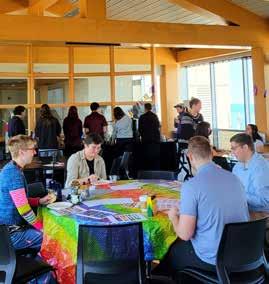

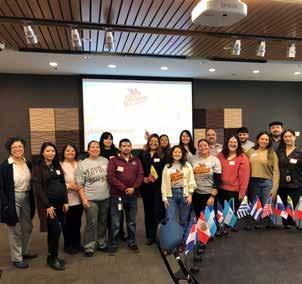
Research shows that employees’ sense of belonging directly influences retention and job satisfaction.
OIDEI believes in the power of Loyola’s faculty and staff to break down institutional silos, build community across campuses, and traverse bridges across difference. Launched by our office, faculty and staff affinity groups help to achieve these goals by creating space for professional development, deepening colleague relationships, and tackling shared challenges—all driven by our faculty and staff colleagues across Loyola. Affinity groups help to achieve our collective goals of increasing inclusion and feelings of belonging by offering a space for like-minded individuals and allies to connect.
Affinity groups proudly promote inclusion and a sense of belonging at Loyola University Chicago. They are open to all Loyola faculty and staff who support the mission and vision of the group.
INTERESTED IN STARTING A GROUP?
If you’d like to launch an affinity group for Loyola faculty and/or staff, contact us at institutionaldiversity@LUC.edu
Current Affinity Groups
ADMINISTRATIVE SUPPORT
Rachel Guy, rguy1@LUC.edu, or Suzan Cibulskis, scibuls@LUC.edu
BLACK FACULTY & STAFF
Cory Barnes, cbarnes9@LUC.edu
EARLY-CAREER PROFESSIONALS
Bizzy Stephenson, estephenson@LUC.edu
JEWISH FACULTY, STAFF, & ALLIES
Laurence Bolotin, lbolotin@LUC.edu
LA LOYOLA: LATINE FACULTY & STAFF
Wendolyn Gomez, wgomez2@LUC.edu
MINDFULNESS & MEDITATION
Dianna Stencel, dstence@LUC.edu, or Christopher Dickman, cdickman@LUC.edu
PRIDE NETWORK
Cami Christopulos, cchristopulos@LUC.edu
READI PROFESSIONAL DEVELOPMENT SERIES
Since we launched the READI Professional Development Series in summer 2023, participants have explored definitions and terminology, identity and intersectionality, and compassionate listening and inclusion, and assessed the landscape for tangible actions to create belonging at Loyola through reflection, group discussion, and experiential activities. Alongside offering regular sessions to all faculty and staff (READI 101–READI 401), we also work with individual units to assess needs and provide customized READI content.



From DEI to READI: Loyola University Chicago Understanding Identity & Identity Intersections


Thriving in Difficult Conversations
Our Roles in DEIB and What We Do about It READI PD Customized to Individual Units
700+ 60+ 97% 2x 4
REACHED SESSIONS POSITIVE RECOMMENDATIONS
The READI professional development participant network has been steadily expanding every semester through word of mouth and full-unit sessions.
With the success of these sessions, we’ve expanded the offerings to all campuses and added expert facilitators to handle the increased capacity.
MORE CONFIDENCE
Those who participated in the entire READI Series were twice as likely to indicate confidence in Loyola’s commitment to diversity, equity, and inclusion. This was especially true for faculty and staff of color.
An overwhelming majority of participants who completed the series say they would recommend it to other faculty and staff at Loyola.
CAMPUSES
READI PD has offered sessions on all four campuses: Health Science, Lakeshore, the Rome Center. and Water Tower.
SIGNATURE EVENTS
We host various events each year to foster community and capacity building. Below are some of the notable leaders we have invited to inspire and educate our community of faculty, staff, and students.
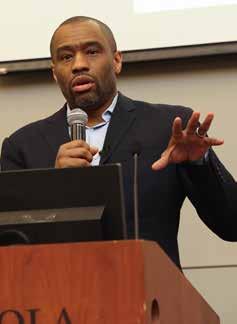




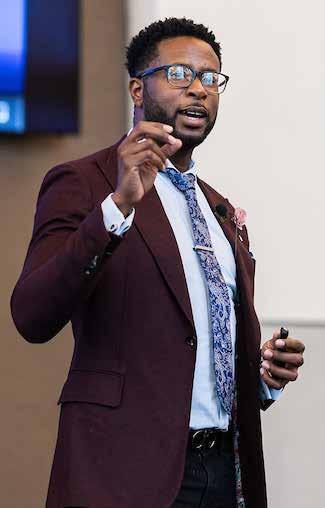
2024 DIVERSITY SNAPSHOT
What would diversity at Loyola look like if we had 100 students?
Undergraduate Student Outcomes: 10-Year Average
Research highlights the importance of looking at data for specific identity groups in order to observe inequities in outcomes. The institutional data below shows retention and graduation rates at Loyola disaggregated by race/ethnicity, Pell recipient status, and first-generation college student status. Groups of students whose outcomes fall below that of the University as a whole are experiencing equity gaps. Our mission is to reduce barriers for these students, who have been historically marginalized in the United States, to close equity gaps in retention and graduation rates.
HIGHLIGHTING EXEMPLARS AT LOYOLA
Schools and colleges at Loyola that focus on inclusive excellence are improving student outcomes. Research in higher education has shown significant educational benefits for students who participate in certain high-impact practices. This is especially true for those from groups that have been historically underrepresented in higher education.
We explored the unique approach of schools at Loyola who are using high-impact practices to purposefully influence student outcomes through socioemotional, academic, or financial interventions.
This should be especially insightful to deans and program directors who share these goals, since research shows that students from historically underrepresented groups are typically less likely to experience these highimpact practices.
After a 2024 school-level analysis of retention and graduation patterns at Loyola revealed some promising trends, we explored these patterns and identified certain schools within the University that consistently showed higher-than-average retention and graduation rates, particularly for students from historically underrepresented groups.
Within these schools, Black and Hispanic/Latine students, Pell recipients, and first-generation college students were persisting at higher rates as well as successfully exiting programs on time at an unprecedented rate (80–100 percent), often exceeding those of majority group students.
Through a series of in-depth interviews with deans and DEI committee members, we were able to glean evidencebased high-impact practices that were put into place at these schools years ago, including establishing a cohort model, building community through summer camps and workshop weekends, creating community impact through partnerships with local organizations, and hiring for new roles focused on student engagement and retention.
With diversity, equity, and inclusion under attack at highereducation institutions, we want to highlight the importance of not only fostering the feeling of belonging campus-wide, but also tying it to tangible measurable outcomes like retention, persistence, and graduation rates.
Through this work, we hope to provide a process and framework for other units at Loyola to leverage existing resources and high-impact practices to address frequently overlooked inequities in student outcomes and bolster student success throughout the college experience, supporting our faculty and staff throughout the journey.
Several schools are intentionally creating impact for historically marginalized students at Loyola. In the following pages, we highlight two schools as exemplars in this work.
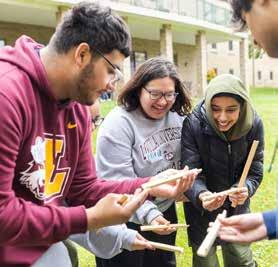
Equity isn’t just about providing access to education; it’s about removing the barriers to success for all students, no matter their background.
Zaretta Hammond
EDUCATOR AND AUTHOR
HIGHLIGHTING EXEMPLARS
SCHOOL OF ENVIRONMENTAL SUSTAINABILITY
High-Impact Practices at SES
Student-Facing Culture
SES has adopted several high-impact practices that have led to exemplary outcomes for students who hold marginalized identities. New Roles That Improve Retention Student Engagement Managers
• SES culture emphasizes being highly available, approachable, and primarily in the building.
• Empathetic, helpful faculty and staff who are excellent facilitators for students.
• Maintaining expectations that students are responsible for meeting faculty halfway to ensure their own success.
Paid Internships
• Offer an alternative to student part-time jobs.
• Sponsored by SES gift funding.
• Provide students with hands-on opportunities that build skills, knowledge, and a sense of belonging.
• Include external internships with SES partner institutions, and 100–150 internal internships at SES annually.
Undergraduate Research Opportunities
• Offer semester-long undergraduate research projects with SES faculty.
• Sponsored by SES Undergraduate Research Programs or LUROP funding.
• Support an average of 42 projects per academic year plus summers. Several projects are strategically placed within BIPOC communities.
Learning and Restoration Opportunities
• Include summer field courses, Saturday Restoration Days, and Weekend workshops sponsored by SES.
• Hosted at Loyola’s Retreat & Ecology campus in Woodstock, Illinois.
• Room and board sponsored by SES gift funding.
• Use a cohort model to improve bonding.
• Engage students in cocurricular activities and internships.
• Explore factors contributing to a sense of belonging at SES.
• Measure progress toward better student engagement, retention, and graduation rates.
Academic Advisors
• Focused on first- and second-year students.
• Provide early access to advising about SES courses.
• Provide information about cocurricular opportunities.
• Connect students to the student engagement manager.
READI COACHES
The READI Coach Program was created to help us expand and institutionalize our collective commitment to diversity, equity, inclusion, and belonging.
The program enables existing faculty to serve as a resource for institutional leaders looking to amplify and execute their strategic inclusive excellence goals. In partnership with OIDEI and the Office of the Provost, READI coaches serve as leaders, experts, and internal consultants to advance the University’s mission and strategic goals. They deliver Learning & Development workshops to promote diversity, equity, inclusion, and belonging, serve as diversity advocates on hiring committees, and act as consultants for departments and units committed to these values. This role was created to be proactive in attracting diverse talent and also to ensure that the culture, climate, policies, and practices reflect our institutional commitment to inclusive excellence.

READI coaches trained more than 400 faculty members on inclusive hiring strategies to assist them in being efficient and effective in conducting faculty hires.
MEET THE TEAM
Behind every milestone in this year’s impact report is a small but mighty team whose dedication proves that big change doesn’t require big numbers—just bold vision and unwavering commitment. The OIDEI team’s passion, expertise and collaboration across campus drive meaningful progress, showing that when people come together with purpose, even the smallest group can spark lasting transformation. This team leads with an eye toward impact while embracing joy along the way.
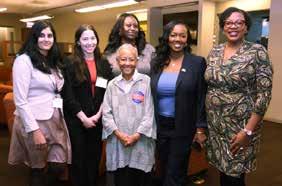

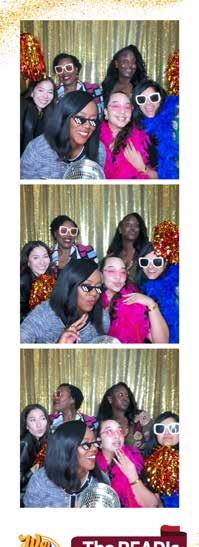
“Never doubt that a small group of thoughtful committed individuals can change the world. In fact, it’s the only thing that ever has.
“

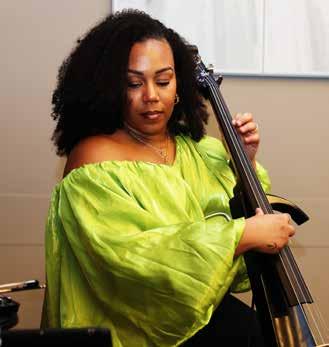
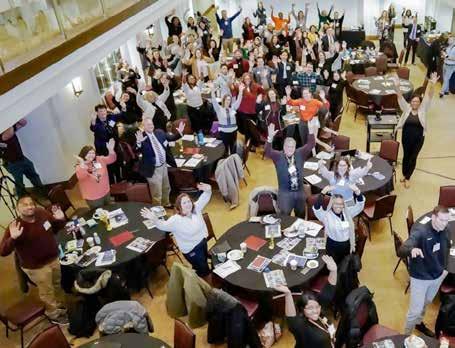
@loyoladiversity
